Johanna Moore, Ashka Jhaveri, Annika Ganzeveld, Andie Parry, and Nicholas Carl
The Iran Update provides insights into Iranian and Iranian-sponsored activities abroad that undermine regional stability and threaten US forces and interests. It also covers events and trends that affect the stability and decision-making of the Iranian regime. The Critical Threats Project (CTP) at the American Enterprise Institute and the Institute for the Study of War (ISW) provides these updates regularly based on regional events. For more on developments and in Iran and the region, see our interactive map of Iran and the Middle East.
Note: CTP and ISW have refocused the update to cover the Israel-Hamas war. The new sections address developments in the Gaza Strip, the West Bank, Lebanon, and Syria, as well as noteworthy activity from Iran’s Axis of Resistance. We do not report in detail on war crimes because these activities are well-covered in Western media and do not directly affect the military operations we are assessing and forecasting. We utterly condemn violations of the laws of armed conflict, Geneva Conventions, and humanity even though we do not describe them in these reports.
Key Takeaways:
- Palestinian militias continued drone and indirect fire attacks into Israel, primarily southern Israel, on October 16. The rate of small arms clashes between Israeli forces and Palestinian militants dropped slightly on October 16 after peaking on October 13.
- Iranian Foreign Affairs Minister Hossein Amir Abdollahian warned on October 15 and 16 that a multi-front war against Israel is becoming more likely and that Iranian-backed militias may take preemptive actions against Israel in the “coming hours.”
- The Islamic Revolutionary Guard Corps is trying to improve its operational security in eastern Syria likely as part of an effort to move advanced military systems into Syria and Lebanon. 250-500 Iraqi Popular Mobilization Forces arrived in Syria and Lebanon on October 16.
Gaza Strip
Recorded reports of rocket attacks; CTP-ISW cannot independently verify impact.
Palestinian militias continued indirect fire attacks into Israel, primarily southern Israel, on October 16. Hamas’ militant wing, the al Qassem Brigades, claimed responsibility for 18 mortar and rocket attacks.[1] Palestinian Islamic Jihad’s (PIJ) militant wing, Saraya al Quds, claimed responsibility for another six mortar and rocket attacks.[2] The militant wing of the Democratic Front for the Liberation of Palestine, the National Resistance Brigades, claimed two mortar attacks into Israel from Gaza.[3] CTP-ISW recorded 10 unclaimed mortar and rocket strikes as well.[4]
CTP-ISW did not record any reports of infiltrations or small arms clashes in southern Israel on October 16.
Recorded reports of rocket attacks; CTP-ISW cannot independently verify impact.
West Bank
This map is not an exhaustive depiction of clashes and marches in the West Bank.
The rate of small arms clashes between Israeli forces and Palestinian militants dropped slightly on October 16 after peaking on October 13. CTP-ISW recorded nine clashes and four marches in the West Bank compared to 32 clashes recorded on October 13.[5] Israeli forces arrested 20 individuals affiliated with Hamas in the West Bank and seized various small arms and ammunition.[6] CTP-ISW previously suggested that arrest campaigns in the West Bank may be contributing to the declining violence.[7] Hamas remains committed to expanding the war to the West Bank, however.
Southern Lebanon and Golan Heights
Recorded reports of rocket attacks; CTP-ISW cannot independently verify impact.
Lebanese Hezbollah (LH) claimed six attacks on Israeli positions in Northern Israel on October 16 and fired an anti-tank missile at an Israeli tank.[8] CTP-ISW recorded one mortar attack into Israeli territory from Lebanon, a decrease compared to seven recorded on October 15.[9] The IDF said that there were multiple small arms clashes on Israel’s northern border.[10] CTP-ISW also recorded one small arms clash between LH and Israeli security forces across Israel’s northern border on October 16.[11] LH released a video on October 16 showing LH militants shooting at Israeli surveillance equipment on the Lebanese border.[12] LH members were seen shooting at Israeli Army radio towers and cameras at outposts along the Israel-Lebanon border.
Israel’s National Emergency Authority (NAE), which falls under the Israeli Ministry of Defense, evacuated Israeli citizens from 28 towns on the Israel-Lebanon border to create a two-kilometer buffer zone.[13] Lebanese Hezbollah steadily increased its activity along the Israeli border between October 7 and 15.[14] CTP-ISW has also reported several unconfirmed reports of militia infiltrations into northern Israel.[15]
Iran and Axis of Resistance
Iranian Foreign Affairs Minister Hossein Amir Abdollahian warned on October 15 and 16 that a multi-front war against Israel is becoming more likely and that Iranian-backed militias may take preemptive actions against Israel in the “coming hours.” Abdollahian stated in an interview with Al Jazeera on October 15 that Israel’s continued siege of Gaza is making a multi-front war “increasingly more probable.”[16] Abdollahian similarly posted on X (Twitter) on October 16 that “the time for political solutions is coming to an end” and that the expansion of the Israel-Hamas war to new fronts is becoming “inevitable.”[17] Abdollahian also warned on October 16 that resistance groups may take “preemptive measures” against Israel in the “coming hours.”[18] Iranian state media recirculated Abdollahian’s warning in English, indicating that their intended audience is the United States and Israel. [19] CTP-ISW will continue to closely monitor the Israel-Hamas war to forecast whether a multi-front war is becoming more or less likely.
- The Iranian regime continues to signal its unwillingness to enter a direct conflict with Israel. Iran’s Mission to the United Nations emphasized that Iran will not intervene in the Israel-Hamas war if Israel refrains from attacking Iranian territory, interests, and nationals in a statement on October 15.[20] CTP-ISW previously reported that Iran has articulated its red line for directly intervening in the Israel-Hamas war as an Israeli attack on Iran.[21]
- Iran and elements of its Axis of Resistance are preparing for the Hamas-Israel war to expand into a regional conflict. Iranian-backed militants have deployed to southern Lebanon and southwestern Syria.[22] These militants include Lebanese Hezbollah, Iraqi Popular Mobilization Forces units, and the Afghan Fatemiyoun and Pakistani Zeynabiyoun divisions. The IDF has conducted airstrikes on Damascus and Aleppo international airports to disrupt Iranian military shipments to Syria and Lebanon.
Iran would likely provide material and financial support to its proxies to fight Israel rather than get directly involved in the Israel-Hamas war were this war to expand into a regional conflict. Direct Iranian involvement would lead to escalation with Israel, which Iran seeks to avoid. Foreign Affairs Ministry spokesperson Nasser Kanani warned Israel against attacking Iran on October 9, threatening a “devastating response” to any attack.[23] Iran has historically used its proxies in Iraq, Lebanon, Syria, and Yemen to advance its regional objectives—such as expelling the United States from the Middle East—while retaining a degree of plausible deniability.[24]
The Islamic Revolutionary Guard Corps (IRGC) is trying to improve its operational security in eastern Syria likely as part of an effort to move advanced military systems into Syria and Lebanon. Iran typically takes steps to reinforce operational security along its ground lines of communication in Syria to protect military shipments from Israeli airstrikes.[25] Israel has conducted airstrikes on the Damascus and Aleppo international airports in recent days, which Israeli media and officials have indicated is meant to disrupt the transfer of Iranian military systems to Syria and Lebanon. CTP-ISW is monitoring Iran positioning its proxies in the Levant to support the Palestinian militias fighting against Israel.
- The IRGC commander of eastern Syria prohibited cell phones at IRGC headquarters in Deir ez Zor city in one of several security measures to protect infrastructure and foreign fighters against airstrikes, according to local media.[26] The IRGC attempted to disguise its activity in eastern Syria by providing personnel with civilian cars and rebranding facilities as Syrian Arab Army positions.[27] CTP-ISW previously noted that the IRGC and LH deployments to Deir ez Zor indicated the militias have struggled to preserve operational security as they expand operations in Syria.[28]
- Israel conducted multiple airstrikes on Damascus and Aleppo international airports on October 12 and 14 which disrupts critical aerial nodes through which Iran funnels military equipment and personnel into the Levant.[29] Iran transfers weapons through these airports, as was the case in February 2023 when it sent air defense equipment to Aleppo along with earthquake relief shipments.[30]
- A senior official at the Israeli Foreign Affairs Ministry indicated that the air strikes in Syria are part of an Israeli effort to prevent Iran from moving weapons into Syria and/or opening a front against Israel from there.[31] Israeli media reported on October 16 that Israel detects an intensive Iranian effort to transfer advanced weapons to LH in Lebanon.[32]
An Iraqi-based open-source intelligence account claimed on October 16 that 250-500 Iraqi Popular Mobilization Forces arrived in Syria and Lebanon. This is consistent with CTP-ISW’s tracking of Iranian-backed foreign fighters deploying to border areas with Israel.[33] Iranian-backed militants have deployed to the southwestern Syrian border since the war began on October 7.[34] These militants also include members of the Afghan Fatemiyoun Division and Pakistani Zeynabiyoun Division, according to Israeli media.[35] IRGC Quds Force Commander Brigadier General Esmail Ghaani was in Syria coordinating some of these deployments as of October 15, according to an Iran-based journalist.[36] LH similarly redeployed militants from Mayadin to Damascus as part of an effort to transfer LH members throughout Syria to the southwestern border.[37]
Iran has pursued greater coordination with Palestinian groups during the past year. Iranian officials, Lebanese Hezbollah, and Palestinian militant groups held meetings, visits, and calls in the year leading up to Hamas’s October 7 attack. The coordination included Iran providing explosively formed penetrators (EFPs), which militants in the West Bank used in attacks against the IDF. This is consistent with comments from the PIJ leader in Lebanon, Ihsan Ataya, who acknowledged as recently as September 28 that Iran supports PIJ with money, weapons, and “everything it needs to confront Israel.”[38] The coordination also occurred after Hamas began planning its October 7 attack on Israel. The group’s spokesperson claimed the group began planning its attack in 2022.[39] The graphic below demonstrates this coordination with senior Iranian political and strategic leadership, as well as Hamas and PIJ military developments.
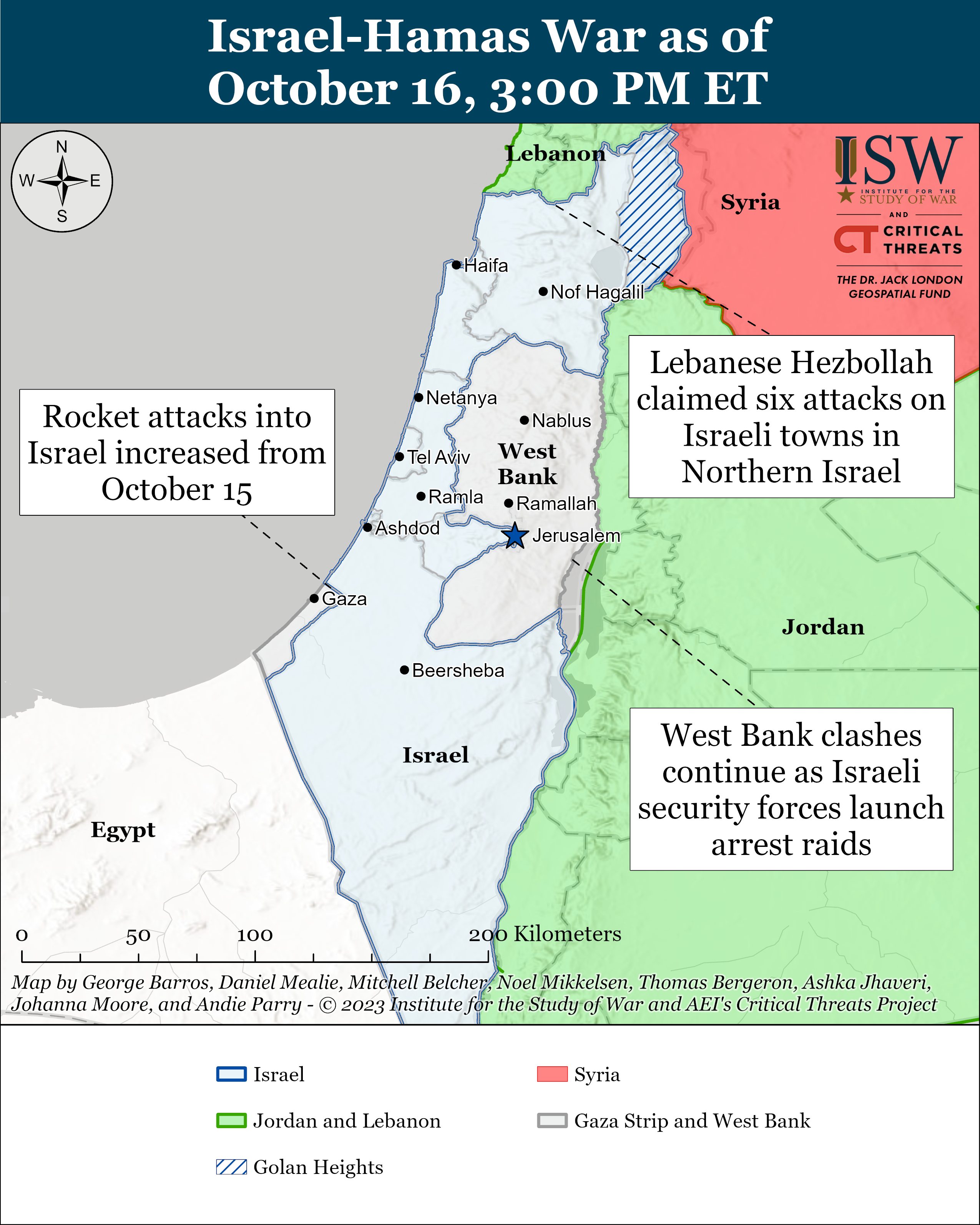
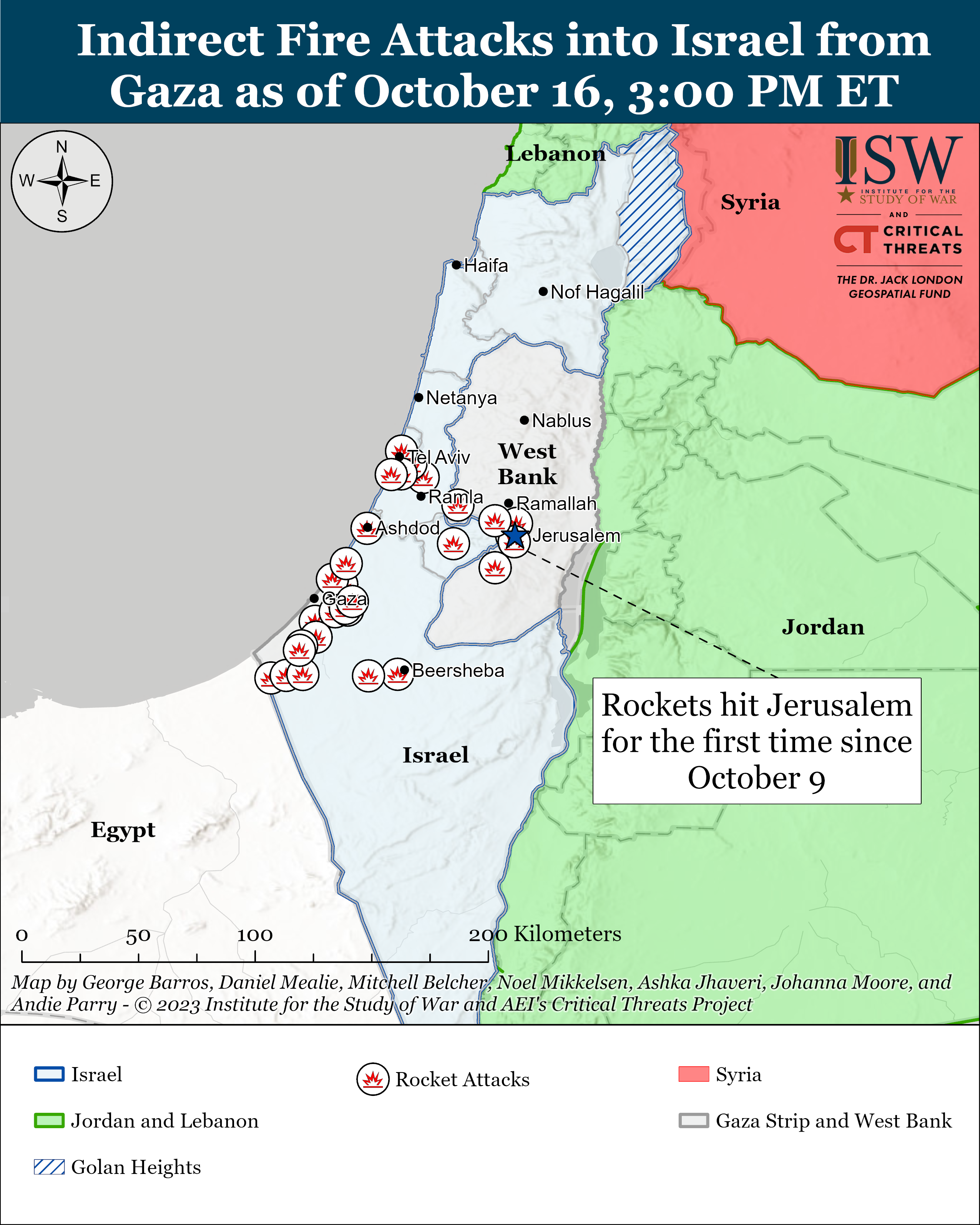
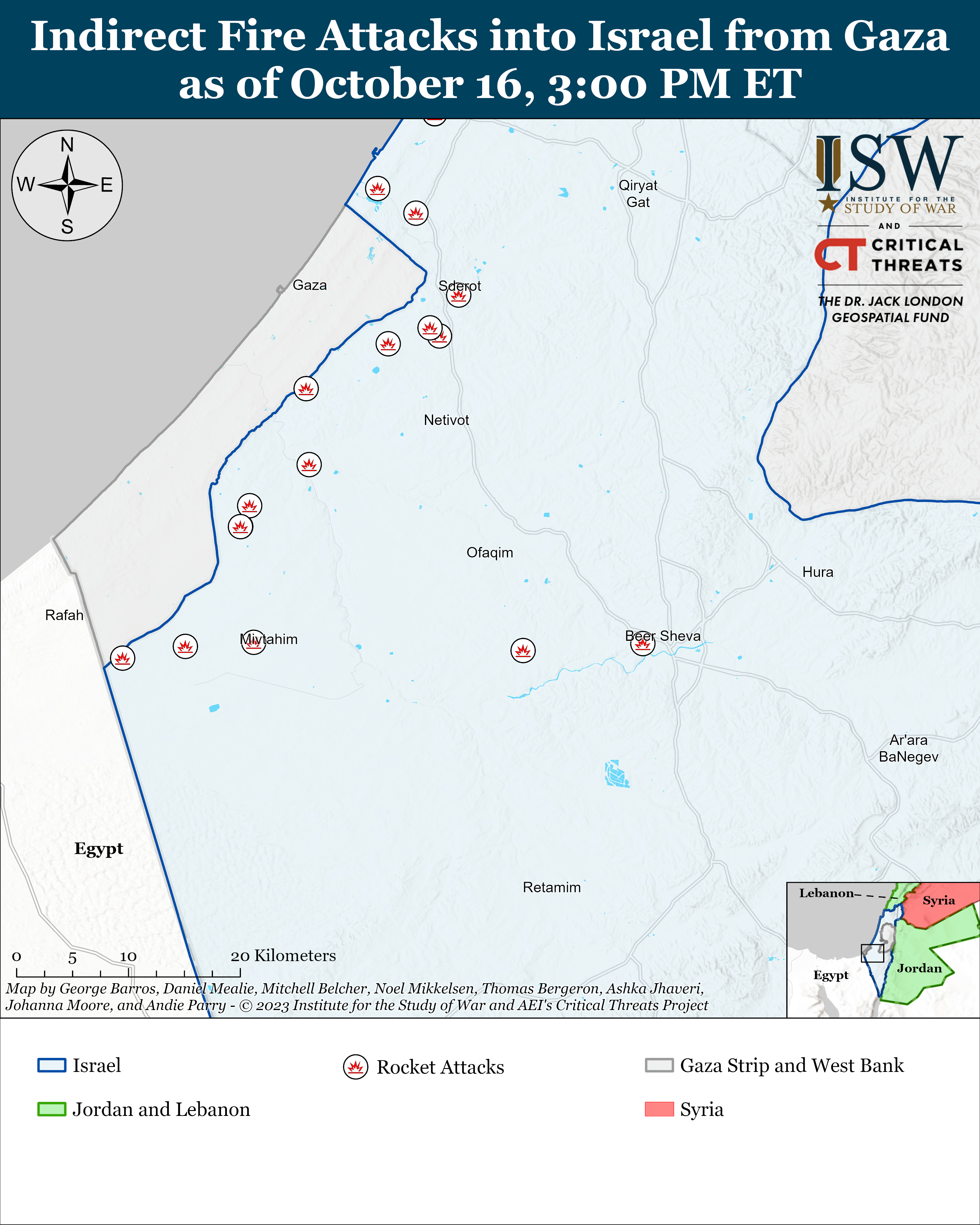
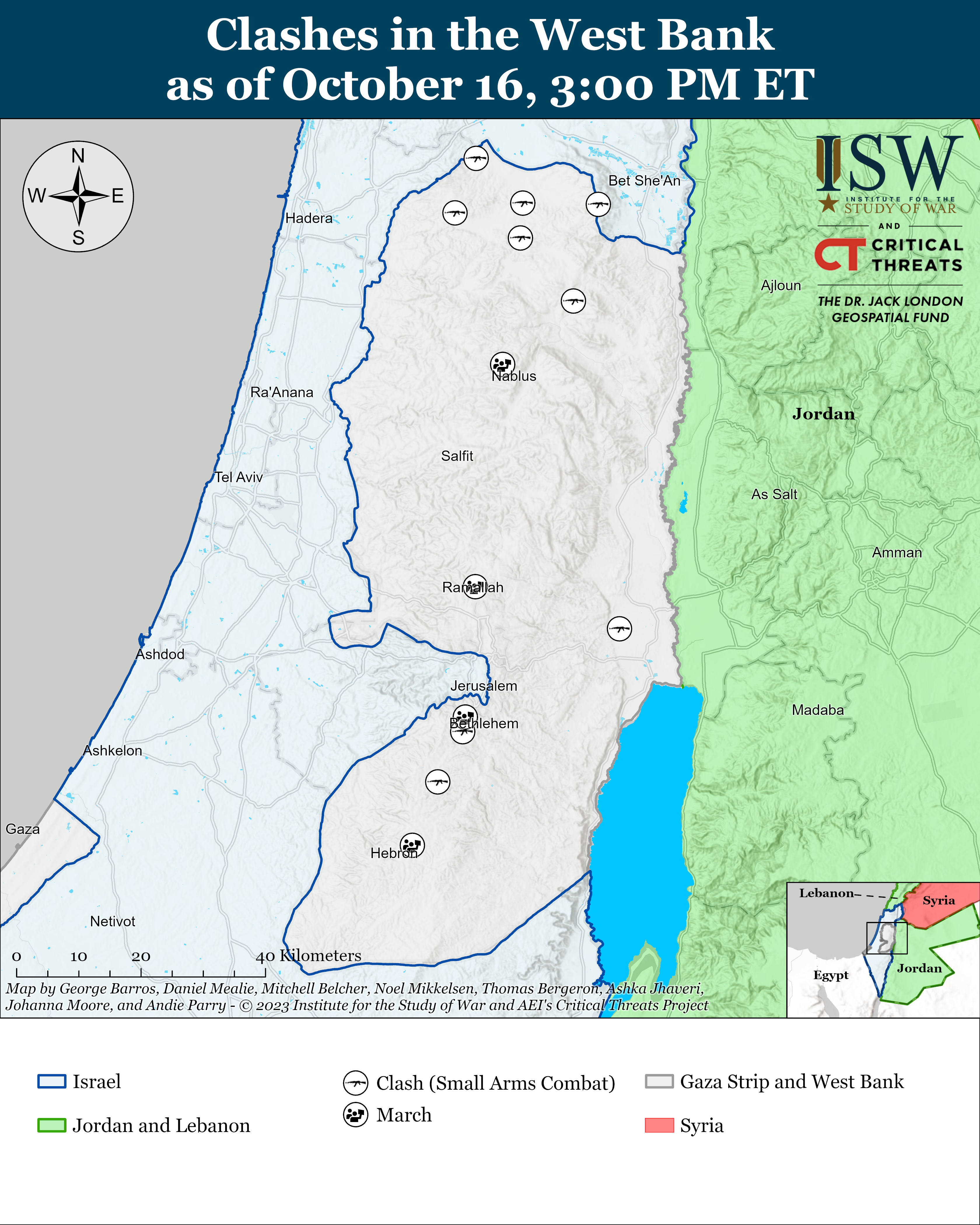
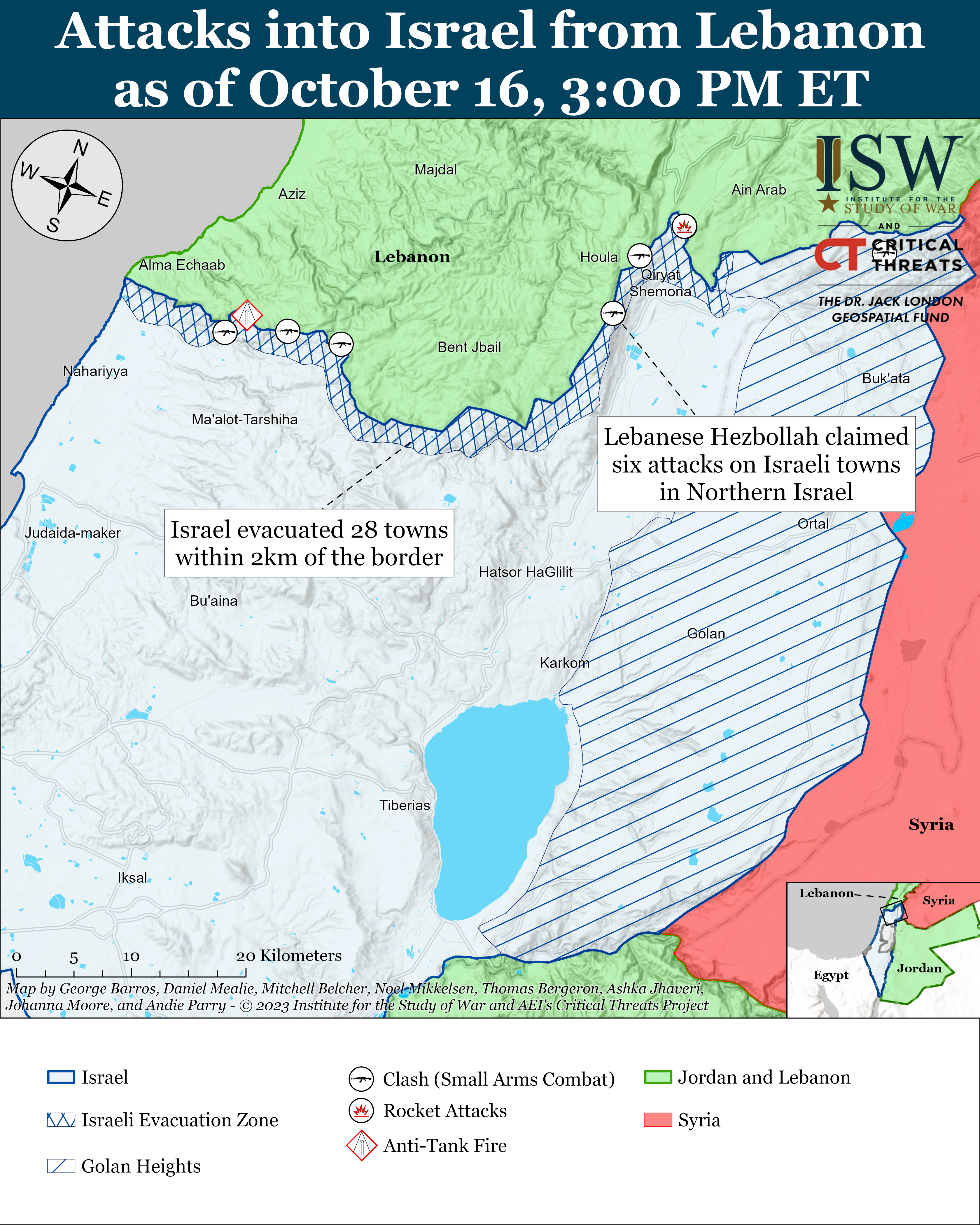
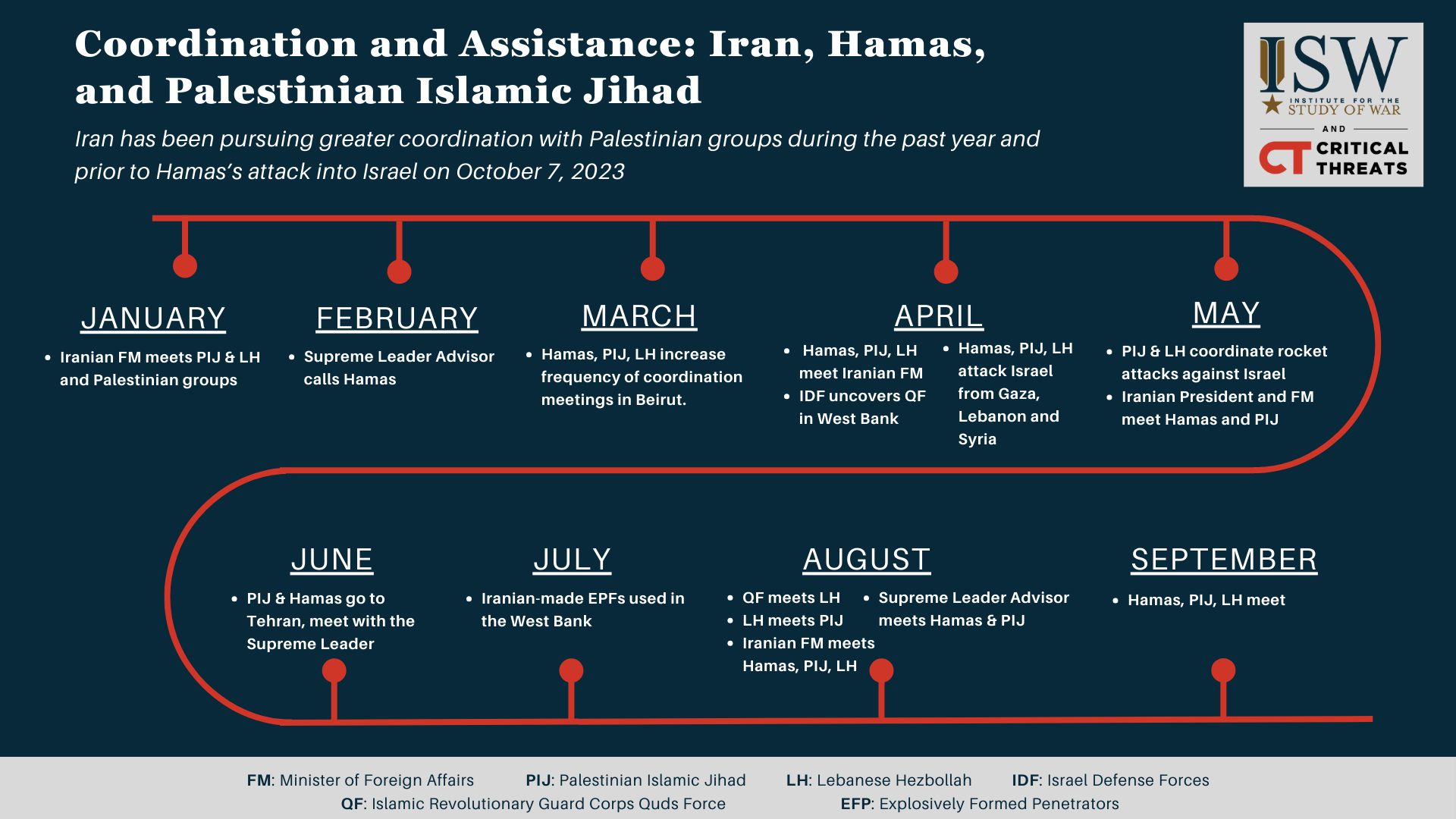
No comments:
Post a Comment